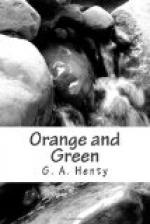Walter rode several times with his father into Dublin. The streets presented a strange spectacle. They were crowded with Protestant fugitives from the country districts. These had forsaken all, and flocked into Dublin, fearing that the Irish would retaliate for past grievances by a general massacre. The banks of the Liffey were crowded by these fugitives, who, with tears and cries, besought the captains of the vessels lying there to give them passage to England. All sorts of rumours of bloodshed, massacre, and destruction circulated through the city. The Protestants in the north were said to have fallen upon the Catholic population, and to have put them to the sword, while in the south and west it was said the Catholics had taken the same measures against the Protestants. Both reports were equally false, but they were generally believed, and added to the panic and dismay.
In fact, however, both parties were waiting. The Protestants dared not commence hostilities until assured that William was firmly seated on the English throne, and ready to come to their assistance. The Catholics were equally desirous to maintain the peace, until assured that no hope remained save the sword.
A month after John Whitefoot had left, Walter received a letter from him:
Dear Friend Walter:
You will have heard, no doubt, of the troubles that have arisen here. My father sent me here to learn a trade, but at present, all men’s minds are so agitated that there is no talk save of arms and of fighting. My kinsman is as bad as the others. He spends the day going hither and thither among the townsfolk, and has been made an officer in one of the six companies which have been raised here, and pays no further heed to business. The town is mightily divided: the younger and more zealous spirits are all for fighting, while almost all the older and wealthier citizens are opposed to this.
“This is how the trouble began. The Earl of Tyrconnell sent, as you know, three thousand soldiers to help King James, at the first news of the landing of the prince, and to do so he withdrew the regiment which was in garrison in this town. On the 7th of this month of December, the people here heard that the regiment of the Earl of Antrim was approaching the town to take the place of those troops. When the news arrived, there was a sort of panic in the town, and the news was spread that this regiment was intended to massacre the people.
“Why this should be I do not know, and I cannot but think that the alarm was a false one. However, the regiment arrived on the river bank, and some of its officers crossed and entered the city. When they were in council with some of the leading citizens, a party of apprentices, with some of the rabble, shut the gates. For some time there was great debate. The older citizens were mostly in favour of admitting the earl’s regiment. Why, they asked, should Derry alone defy the power of Tyrconnell and King James? If King William made his cause good, and came over to Ireland to aid the Protestants, it would be time enough for the men of Derry to join him, and to fight for their faith; but if they now stood alone, they could do no good to the cause of King William, and would bring destruction on themselves and their city.




